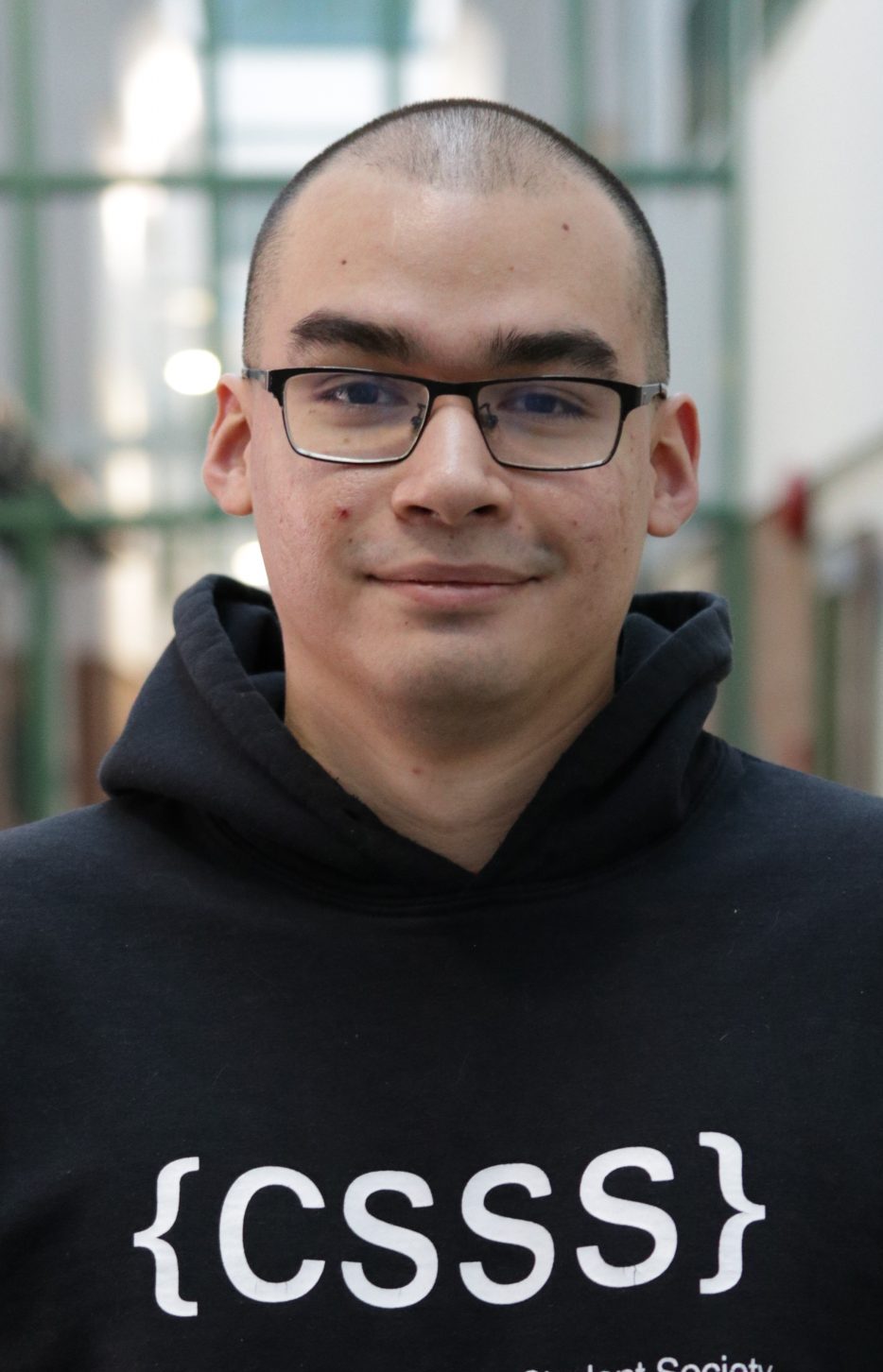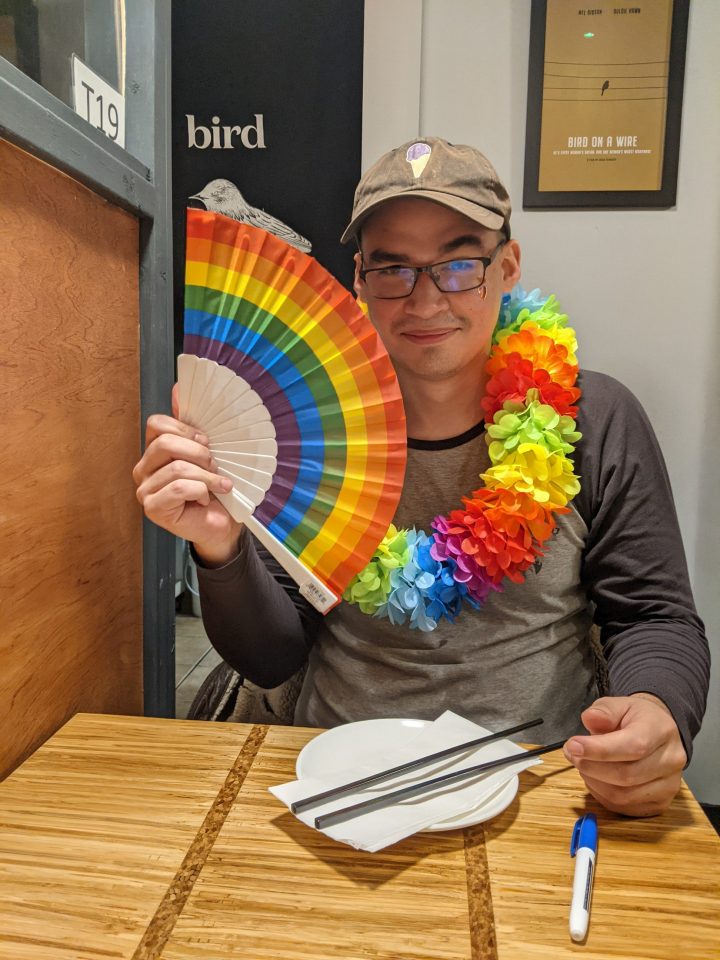Hannah: What is your role at EML, what do you do on a typical day in your position? Dante: This is actually kind of interesting because it’s changed over time. Term by term, my responsibilities have shifted a bit, trending towards leading projects. When I first joined EML I was more focused on doing development, so more nitty gritty technical details and trying to get that stuff figured out. That was my introduction to EML, but now as time has gone on I’m more needed on the side of leading projects and I’m also learning more on that aspect as well, and that’s been educational for me. So my title at EML right now is software developer for academic innovation, and that’s what I try to foster at EML; the application of technology for educational purposes with a focus on trying to potentially build something that’s new and different that we can apply in curriculums. H: On a daily basis, do you focus on one project or jump around to all project teams? D: I’m overseeing 5 different projects right now. So 2 of the projects I’m working on right now are involved with Patrick Pennefather’s rapid prototyping course, so that’s been really interesting cause I’m getting to learn some aspects of what he’s teaching in that course, and also I’m applying it to the other projects I’m involved in. So as I’m learning new things—I can apply them to my leadership, I can apply them pretty much on the go. So yeah, I lead sprints, I plan sprints, I give technical advice, and along the way I try to have our work learn’s and students gain some education out of what they’re doing for the projects. Because in the end that’s what it’s about for us as well right, not just producing a product that the teachers will be able to use but then also giving students the opportunity to learn something that they will be able to apply in other projects as well. H: What would you say you value most about EML, or what is your favorite thing about the work that you do? D: I would say there’s 2 things. One of them is how much freedom we get to decide what we can do, and the fact that everything we do is skewed towards innovation means that we have the chance to try new things—and actually want to be trying something that’s new for us. If it’s already established then EML is probably not the place you want to go to in order to figure out how to do it—you can contract and all that stuff. So I love that aspect of my work. My favorite thing, that originally kind of stressed me out a lot, but now that I’ve done it a couple times it’s really fun is the end of year showcase, just because it’s a really nice time for everyone who isn’t involved with EML on a day to day basis to get an overview of what’s happened that term. It also gives students the opportunity to talk to people who show up to the showcase—which are people who, I don’t want to say are more important, but we get people that are higher up and will observe, and the students get the chance to talk to them and explain what they’ve been doing so I like that a lot. H: What would you say are the skills you’ve gained working at EML? D: I think I’ve gained both hard and soft skills. I have a degree in computer science but that doesn’t mean that you have already everything figured out about software development. One big aspect that I’ve been educated about is software collaborating, so it’s something that gets taught to you in your degree but not necessarily something you’ll get a solid understanding of once you’re out. But I feel like I do now, mainly because I’ve developed a better language around how to communicate my ideas and technical designs to other people; diagramming, sprint planning— those are things I’ve gotten to practice a lot more because of EML. So those are probably the hard skills, and soft skills are probably interpersonal and leadership skills. I think when I was starting off, and as I mentioned, it’s been a transition for me going from technical to leadership because I wasn’t really confident in my ability to lead a project development team, but now that’s changed a little bit and I’m going harder into the aspect of project management, at least this term, and that’s the trend I see for myself. H: What are some of the challenges or obstacles you’ve faced working at EML, and how have you overcome these challenges? D: So I would say this is kind of an ongoing challenge, and dealing with it on a case by case basis is the best way to approach it, but at EML we like to have students learn a lot but at the same time we have an expectation to deliver some sort of product or experimentation or documentation towards the end. So the challenge every term for me is to bridge the gap between students’ learning and abilities at the beginning of the term and how we can get them to learn along the way, and then at the same time being able to learn by doing and produce something that we can present at the end of the term. I never expect this to become easier because it’s always going to be thinking about an individual students’ wants and needs educationally and how that can be folded into the project. It’s actually a really interesting challenge for me as well. At the beginning of the term we have a list of students that are interested in working on projects and we have an idea of what their expertise are, but every single time there’s always going to be gaps in knowledge or stuff we need to figure out. It’s like, ok, now we know what this project needs to do, and we know this student that’s going to be working on it doesn’t necessarily have the project, so we need to plan projects so the student can learn the pieces that they need to at the time that the project is moving forward and developing itself. So that’s the biggest challenge for me at EML, but also one that I enjoy. H: How do you like the community environment at EML? How has it changed since transitioning online? D: I love the community at EML. I think I always have. I’ve been involved in EML even before I graduated from UBC. I was just trying to show my face around and be involved with projects, and I used to be part of AGDA—the AMS Game Development Association, and during that time some of the other club members talked about the VR division of AGDA that’s collaborating with EML and that’s when I first heard of it. Then I was working at HIVE and collaborating with EML by going back and forth, and then the COVID crisis hit and it ended up being the case that I wasn’t going to be able to do this interdisciplinary collaboration between 2 labs, I was going to have to focus on the work that was happening just at EML, at least for the time being. And now that’s kind of expanding further and we’re working on new collaborations with HIVE, but in the meanwhile it’s been great. Just developing stronger relationships with the people I’m working closer to—Catherine, Daniel, all of the world learns. Actually for a couple of them I’ve been working with them for a little over a year now so that’s started to become a longer term relationship as well. But yeah, I love that when we come to the meeting, everyone is interested in either learning something new or has something going on in their life. I mean, I don’t want to say that we force everyone to share, but in a way we do with the roses and thorns, but I think that’s also a good aspect of getting everyone to see each others faces and learn a little bit about each other’s lives because we’re all so isolated nowadays. H: How would you say that your time so far at EML has influenced your future plans, studies, career goals, or personal hobbies? D: I guess when I started my time at EML, I was thinking probably what every other computer science student is thinking, like getting into Big 5 or some other big company to work on complex software collaboration projects that have some sort of effect. But I’m not as interested in the climb anymore, because from what I’ve seen and my understanding of software collaboration, it’s not necessarily that working at a company with a big name is going to give you the opportunity to work on really interesting projects. So, I’ve kind of pivoted away from that form of thinking and more depending on myself to come up with the projects I’m working on and then if the stuff that I’m working on I find interesting, I’m trusting that the people around me and the people in the community and the industry as a whole will also find it interesting, and things will just develop naturally as a result of that. I don’t like interviews, I’ve never been great at interviews, and if I’m being fully honest when I was doing the transition from HIVE to EML, I was also doing interviews for Microsoft and other places that I didn’t get into because I was too ambitious for the positions I was applying for. But now that I’ve spent some time at EML developing my skills a little further, I don’t want to go back to that spot where I’m trying to find my way into the lower level positions at one of those companies. I feel like I have the skills to have an opportunity come to me as a result of the work that I’m doing here. H: Is there anything else you wanted to talk about that wasn’t covered? D: Yeah, I want to tell people to look out for the Biomedical Visualization and Communication UBC Certificate Program that’s being started up by the HIVE! The one [course] I’ve had such a great experience working with so far is the rapid prototyping course. Another interesting point is that, chances are if you’re in this course you’ll get to collaborate on an EML project through the course.
Meet Dante, the lead software developer for academic innovation at EML. Dante graduated from UBC’s computer science program in 2018 with a focus on distributed systems and computer graphics. Since working at EML, Dante has gained valuable skills in software collaboration, project management, and leadership through overseeing various student project teams. To find out more about Dante’s role, check out the interview below!
If you’re interested in getting involved with EML, check out our student opportunities here, come to our drop-in hours, or send an email to emergingmedia.lab@ubc.ca.
